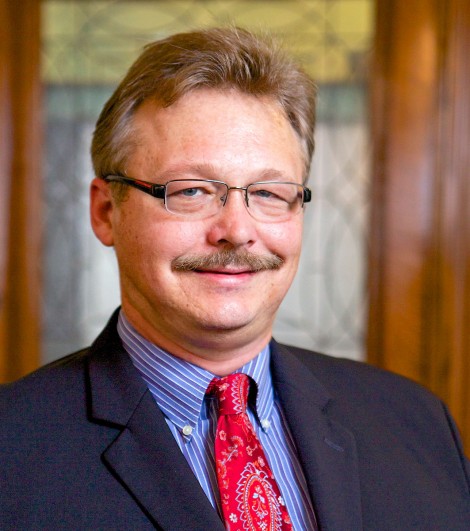
Ukrainian Situation Calls for ‘Diplomatic, Intelligence, and Economic Tools,’ Foreign Policy Expert Says
DELAWARE, Ohio – “Russia’s incursion into Ukraine presents the United States with a dilemma,” writes foreign policy expert Sean Kay, Ph.D., in a March 2 guest commentary published by The Duck of Minerva, an online outlet that examines world politics from an academic perspective.
“The cries to ‘do something’ are loud,” continues Kay, a professor of politics and government at Ohio Wesleyan University. “The situation in Ukraine is, nonetheless, complicated and there is as much possibility that our efforts to do something can be well-intended but inadvertently make the situation worse.”
Kay subsequently is interviewed by London-based BBC Radio’s “5 live” program and by Bloomberg News in Washington, D.C. He reiterates that the United States has to be careful in defining its involvement in Ukraine.
“We do not have a lot of levers we can pull” to influence Russia, he tells Bloomberg News. Read the full article, “Kerry’s Kiev Trip Puts Him on Diplomatic Front Lines.”
Kay also discusses the international Ukrainian issue and its implications March 4 on the NPR-affiliated talk show, “All Sides with Ann Fisher. “All Sides” is broadcast on 89.7 FM and archived online afterward for on-demand listening.
Sean Kay, Ph.D.
In addition, he shares thoughts on whether Crimea could help NATO to enhance its prestige in commentaries published in War on the Rocks and The Huffington Post. In the pieces, Kay states: “NATO members are not a unified bloc. There are deep divides between new and old members, especially over how to approach Russia. It is likely that some will now quietly question the wisdom of having pushed NATO into the former Soviet bloc. They will have renewed concerns about new members drawing them into peripheral conflicts.”
Read the full commentary, “Will Crimea Save NATO? Not So Fast.”
Kay is the author of several books including “Global Security in the Twenty-First Century: The Quest for Power and the Search for Peace” and the soon-to-be-published “America’s Search for Security: The Triumph of Idealism and the Return of Realism.”
In his initial March 2 commentary, “America’s Strategic Dilemma in Ukraine,” Kay offers this insight:
“The Ukrainian situation is serious, and it is destabilizing to the immediate region. It is highly possible that, if it escalates, we will need to bear significant costs and risks. These should be limited, however, to diplomatic, intelligence, and economic tools. And we should be clear-eyed with ourselves what this means. If the situation escalates, then we risk losing essential Russian engagement on North Korea, Afghanistan, Iran’s nuclear program, and Syria. We risk economic retaliation against European allies at a time of continued deep economic difficulty in the Eurozone. It will mean owning economic responsibility for rebuilding Ukraine – requiring many tens of billions of dollars of loans from the American treasury. So, our policies need clear-eyed realism – and they need to start with the basic assumption that, as bad as this is, our main interest is that it de-escalate and fast.”
At Ohio Wesleyan, Kay also serves as director of the Arneson Institute for Practical Politics and Public Affairs and as chair of the International Studies Program. He is a Mershon Associate at the Mershon Center for International Security Studies at The Ohio State University and a fellow in foreign policy and national security at the Eisenhower Institute in Washington, D.C. Read more about Kay at https://owu.dev.fastspot.com/academics/departments-programs/department-of-politics-government/faculty-staff/sean-i-kay/.
Founded in 1842, Ohio Wesleyan University is one of the nation’s premier liberal arts universities. Located in Delaware, Ohio, the private, coed university offers more than 90 undergraduate majors, minors, and concentrations, and competes in 23 NCAA Division III varsity sports. Ohio Wesleyan combines a challenging, internationally focused curriculum with off-campus learning and leadership opportunities to connect classroom theory with real-world practice. OWU’s 1,850 students represent 42 states and 37 countries. Ohio Wesleyan is featured in the book “Colleges That Change Lives,” listed on the 2013 President’s Higher Education Community Service Honor Roll with Distinction, and included in the U.S. News & World Report and Princeton Review “best colleges” lists. Learn more at www.owu.edu.
